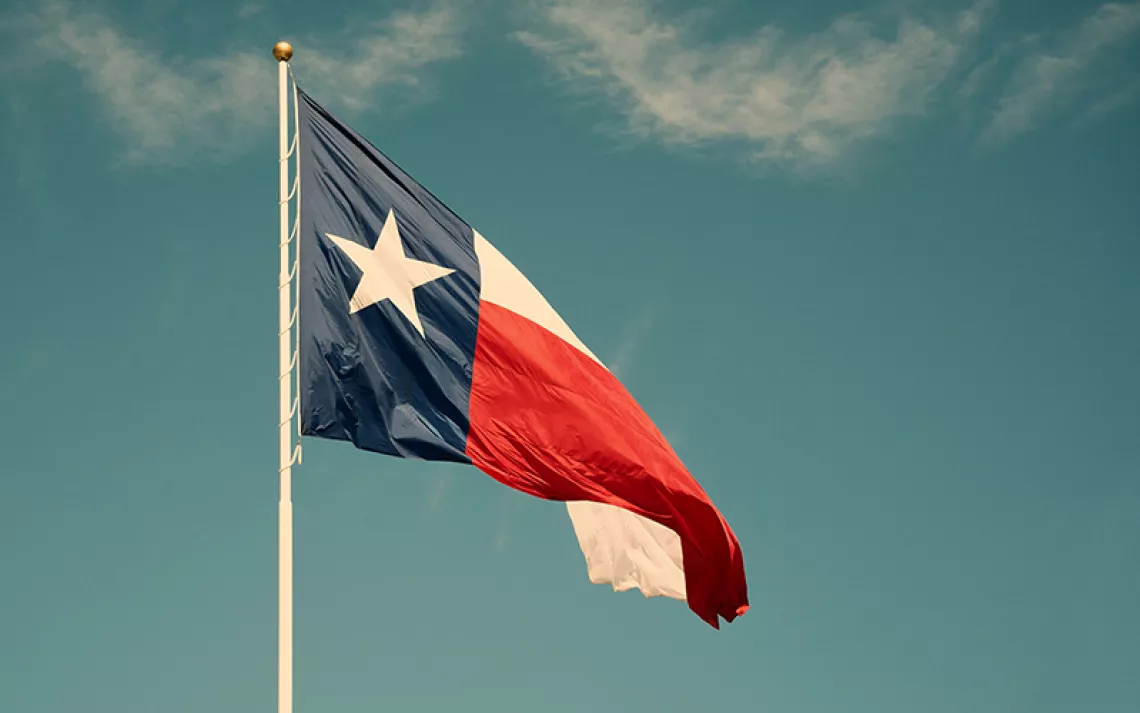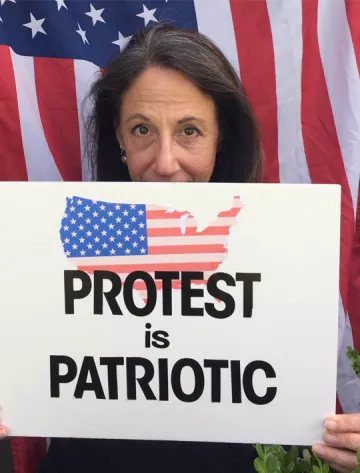Texas Has Honed Voter Suppression to an Art
I sign up voters in Texas, a state that makes it as hard as possible

Photo by leekris/iStock
It's a hot summer afternoon in Texas. I'm in an auditorium at the US Citizenship and Immigration Services offices in Irving. People from all around the world are here with their families, many holding tiny American flags. A video of President Donald Trump plays at the front of the room. "No matter where you come from or what faith you practice, this country is now your country," he says. "Our history is now your history, and our traditions are now your traditions. You enjoy the full rights and the sacred duties that come with American citizenship. Very, very special."
The room buzzes with excitement. An official reads off the many countries represented in the room, from Afghanistan to Zimbabwe, and asks the almost-citizens to stand. Then, all raise their right hand to take the Naturalization Oath of Allegiance. "I hereby declare," they say in unison, "that I absolutely and entirely renounce and abjure all allegiance and fidelity to any foreign prince, potentate, state, or sovereignty." At this point, a few of the volunteers I came with grab clipboards and get ready to slip into the crowd so they can intercept as many people as possible. "I take this obligation freely, without any mental reservation or purpose of evasion, so help me God," concludes the group, now officially US citizens. The crowd cheers. I stand at the table and brace for the onslaught.

There are a few minutes of chaos, forms a-flyin'. I'm here to register these brand-new citizens to vote, and there's no time to make mistakes. I ask each person which county they're from, then give them the correct form for that county and answer any questions they might have. Then I double-check each form. Did the applicant mark those two crucial hard-to-notice boxes up top confirming that they are a US citizen and old enough to vote? Did they include their driver's license or Social Security number? Will the county officials be able to read their handwriting? After that speed-check, I sign the form, date it, and write my ID number as a volunteer deputy registrar (VDR) for their county (being careful not to put my Dallas County number on an Ellis County form), then provide a receipt.
Photo courtesy of Sophia Dembling Registering people to vote might seem like a sweet, undemanding pastime. Thirty-eight states make it possible to register online. Eleven states automatically register eligible voters when they are of voting age. Twenty-one states allow voters to register on the same day as an election. Then there's Texas, which has honed voter suppression to an art.
To register in Texas, would-be voters can fill out a form and mail it to the county voter registrar's office (or go to the office in person). Or they can register with a badge-carrying volunteer like me, if that volunteer is deputized in the same county in which the citizen resides.
I got passionate about politics after the 2016 election. I went to DC for the Women's March, knocked on doors, and organized political rallies. I also went to the Dallas County election office and, after a 30-minute training, walked out with a small paper badge declaring me an official volunteer deputy registrar.
Of all the things I do with my newfound civic energy, registering voters is the most satisfying. Voting is democracy at its purest, and people are invariably grateful for the opportunity to register.
As I began registering voters, I quickly realized that being deputized in only one county was fine if I was canvassing just my neighborhood. But at a naturalization ceremony, I could register a new citizen from Dallas County but not her uncle from Kaufman County. There are 254 counties in the state of Texas, and Dallas alone is part of five different ones. If a voter moves across town, they might need to reregister in a new county—and I must be deputized in that county to help them.
One day, my friend Daniel and I took a little road trip to get deputized in as many north Texas counties as we could. I'm now deputized in seven: Dallas, Tarrant, Collin, Ellis, Rockwall, Kaufman, and Denton. Daniel is deputized in 11 and counting, though at this point he might just be showing off.
There are drawbacks to being registered in so many counties. A VDR has to deliver voter registration forms to the relevant county election office in person, during business hours, within five days of the form's completion. This, we were sternly warned in training, is not a suggestion; it is the law. A busy VDR might shell out significant cash on gas alone. I once drove 30 minutes to deliver a single form to Ellis County.
Once the paperwork is delivered, the VDR's job is done, but then all those handwritten forms have to be entered, one by one, into the voter rolls. If a form is hard to read or incomplete, the election office is supposed to call the would-be voter and follow up, though I wonder how many actually do.
A voter registration system this inefficient is a waste of money. It is also one of the reasons—along with harsh voter ID laws—that the state has such a dismal voter turnout.
You'd think all politicians would be eager to make voting easy, but in Texas, not so much. "The Democratic Party, when it has been in control, has tried to make voter registration and turnout easier," says Cal Jillson, a political scientist at Southern Methodist University in Dallas. "The Republican Party has made registration and turnout increasingly difficult."
Sometimes I go to schools, where I try to use my status as a member of the retired-lady demographic to persuade the kids that voting is worth the effort. "Look at us," I said one afternoon to a classroom of high school seniors, whose interest level ranged from fully engaged to barely awake. "We're the ones making decisions. Do you want us making all the decisions?" (I have to admit, I get tired of saying that. I'm not completely out of touch.) "I know that the cost of college is a huge issue," I continued. "But when push comes to shove, I'm more concerned about Medicare."
The closer it gets to the 30-day cutoff before an election, the harder it is for me to relax. Every place I go, every person I see is a potential voter who could be lost. I registered my dermatologist after an appointment, and a guy on a train who saw my voter registration clipboard. Once, I put on my "Register to Vote" T-shirt and set up a table under a flickering beer sign in my local dive bar. I registered only one voter that night. It was a guy whose girlfriend dragged him over because she had discovered that he'd lied to her about being registered. (He was sheepish and did as he was told.) Heading home one night, Daniel saw a long line of young people outside a nightclub, waiting to see a band called Ninja Sex Party. He stopped, pulled out his clipboard, and worked the line.
One rainy day, a fellow VDR named Val and I slogged through mud and puddles, up and down staircases, and around the maze of buildings at a low-income apartment complex in our neighborhood. It was a weekday, so neither of us was holding out much hope that anyone would be home, but it was right before the cutoff date to register to vote in the 2018 midterms.
Most people weren't home. A few others declined to open their doors. But hours later, we had registered about 10 new voters between us. We felt like warriors. Sodden but triumphant.
I strongly believe that we need online registration in Texas. It would be more efficient and less expensive and provide much less room for error. But a little part of me would miss the person-to-person contact of registering voters one at a time, from the high school student who just awakened to the power of their vote to the former felon who was eager to vote again and have his say on prison reform. I'm just one tiny cog in the voter registration machine, one of 3,100 VDRs in Dallas County at this writing. But our hard work is paying off. It was recently reported that for the first time in its history, Texas has more than 16 million registered voters. The ranks of the registered are growing faster than the population.
I save all the receipts from voters I register. The growing stack of cards, torn from the full forms, is reassuring to me, proof that I didn't just get mad. I got busy.
This article appeared in the May/June 2020 edition with the headline "Are You Registered to Vote?"
 The Magazine of The Sierra Club
The Magazine of The Sierra Club